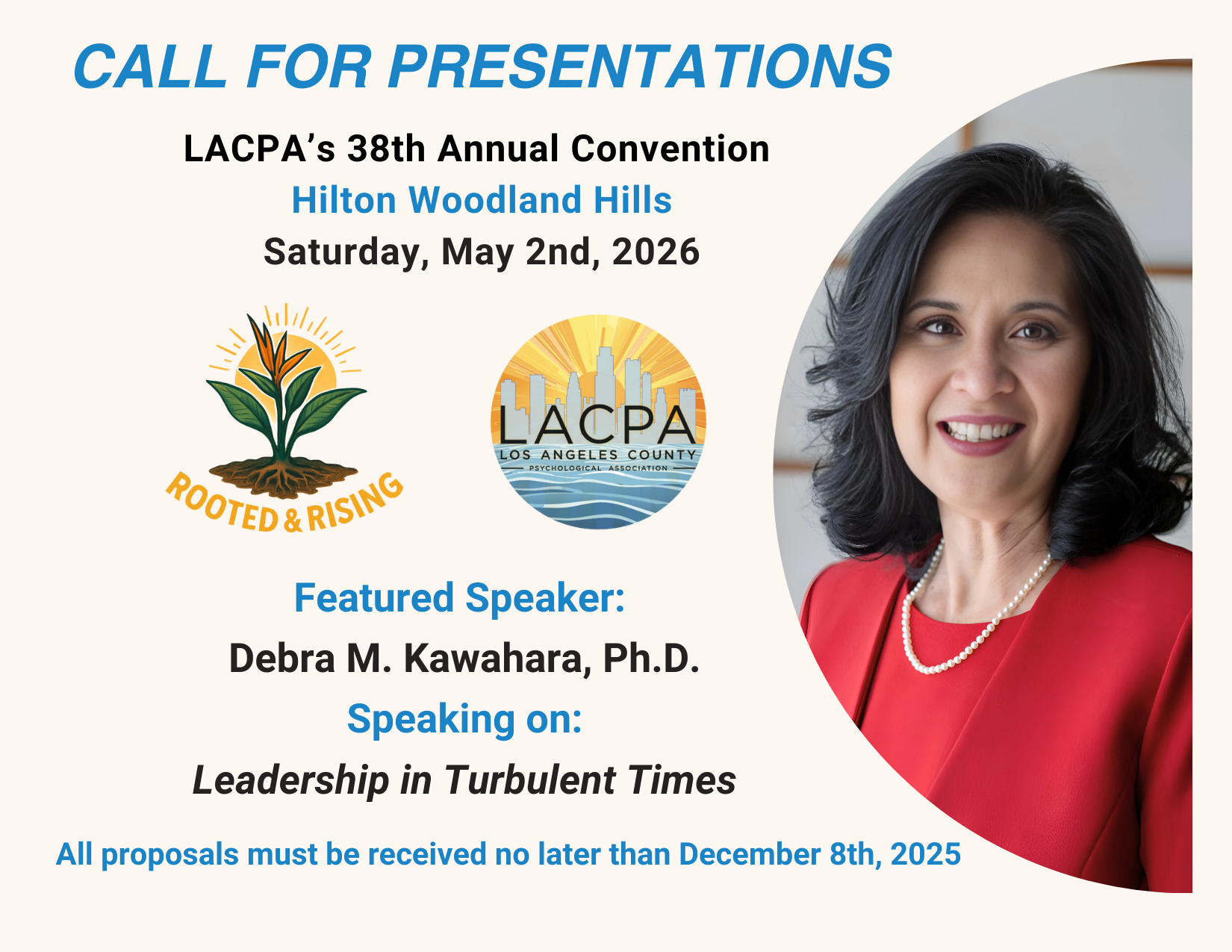
All proposals must be received no later than December 8th, 2025
Los Angeles County Psychological Association
38th Annual Convention
Saturday, May 2nd, 2026
Hilton Woodland Hills
- Submission Requirements please review these instructions carefully:
- Proposals must be submitted through the application above
- or contact the LACPA office [email protected].
- Proposals that do not follow the application format and/or are missing information will be returned without consideration.
- No honorarium is provided for convention presenters. If presenters plan to attend the full convention, registration, at a discounted rate, is required.
- Reasonable A/V equipment will be provided.
- Multimedia presentations are required.
- The LACPA Convention Committee is accepting proposals on all topics.
- Attendees have expressed interest in programs on:
AI Revolution, Addiction, Couples/Relationship Therapy, Diversity and Social Justice, Geriatric Care, Innovative Therapeutic Techniques, Law and Ethics, Psychopharmacology, Sleep Management, Trauma Therapy, Women’s Mental Health, Youth Issues
Multicultural perspectives on all topics are welcomed.
- Proposals will be reviewed by the LACPA Convention and Continuing Education Committee.
- Please note that the Committee receives a large number of submissions and some are on the same topic. Therefore, broad clinical appeal and uniqueness of approach do help a presentation stand out. Upon request, a sample Convention Proposal Rating Sheet is available. This sheet serves as a broad gauge used by the Committee for proposal selection. The Committee also makes its decision based on the following guidelines:
- Proposals should reflect intermediate to advanced levels of learning, the more advanced the better;
- A limited number of presentations will be selected;
- Proposal topics should be based upon clearly stated educational goals and objectives;
- Proposals should reflect applicability and relevance to doctoral-level psychologists in the areas of clinical practice, theory, research, and methodology;
- Proposals should demonstrate how the presentation will be organized in order to best facilitate the learning process for attendees;
- Proposals should be objective (i.e., not reflecting any commercial views of the provider or presenter or anyone giving financial assistance to the provider or presenter);
- Proposals should be accompanied by a syllabus that contains instructional objectives, learning methods (i.e., lecture, slideshow, video, case material, etc.), and an outline of the major points to be presented;
- Should you require assistance or clarification, please do not hesitate to contact the LACPA office.
- All proposals must be received via email no later than December 8, 2025.
- All presentations will be for a two-hour time frame.
- There is a maximum of two presenters and one moderator per session.
For consideration, convention proposals must include:
- Completed Application through LACPA website
- Section E. of the application: authorization by all presenters, chairs, moderators named on the application
- Abstract - maximum of 50 words
- Course Goals and Educational Objectives, Course Outline and References in the most current APA format, including the citation's Digital Object Identifier (DOI).
- Bio (maximum 60 words) for each presenter
- CV of each presenter (may be pdf)
- One headshot photograph of each presenter (233 KB or higher jpg file required)
Submit all of the above materials HERE
|